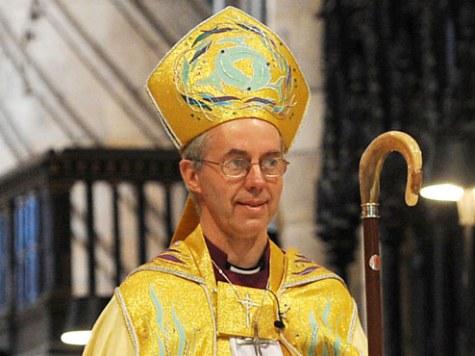The Church of England may split despite the Archbishop of Canterbury’s best efforts to hold it together, as the views of evangelical men and the rest of the Anglican Communion are drifting further apart over issues such as gay marriage and abortion.
In his address to the General Synod last week, Archbishop Welby told members that he had made 14 trips over the last 18 months to visit Primates in all parts of the world. What he found is that the worldwide Anglican Communion is “a flourishing Communion but also a divided Communion.”
He warned “Our divisions may be too much to manage. In many parts of the Communion, including here, there is a belief that opponents are either faithless to the tradition, or by contrast that they are cruel, judgemental, inhuman. I have to say that we are in a state so delicate that without prayer and repentance, it is hard to see how we can avoid some serious fractures.”
His words are supported by a recent survey commissioned by the Westminister Faith Debates from YouGov, in which 1,500 Church of England clergy were asked for their opinions. It found that “a relatively small group of the most evangelical male clergy” could provide a barrier to the unity that the Archbishop calls for, Christian Today has reported.
Approximately one in three clergy identified themselves as evangelical, but the survey threw up some profound differences of opinion between them and the rest of the Communion. For example, 88 percent of the evangelicals believe that gay marriage is wrong, compared with just over a third of the rest of the clergy. Likewise, just 16 percent of the Anglican clergy in general would like to see abortion banned completely; a figure that doubled to 31 percent amongst the evangelicals.
According to the report on the survey, “While the majority of clergy support the aim of ‘maintaining unity by being more tolerant of diverse views’, two thirds of the evangelical clergy disagree, contending either that the Church should seek greater uniformity of views or else that it should not be afraid of separating amicably along doctrinal and ethical lines.”
Specifically, the survey found that evangelical men upheld this view, as 68 percent of evangelical men disagree with supporting greater tolerance, against 61 percent of evangelical women who supported the principle.
In his address, Archbishop Welby said “the future of the Communion requires sacrifice. The biggest sacrifice is that we cannot only work with those we like, and hang out with those whose views are also ours. Groups of like-minded individuals meeting to support and encourage each other may be necessary, indeed often are very necessary, but they are never sufficient. Sufficiency is in loving those with whom we disagree. What may be necessary in the way of party politics, is not sufficient in what might be called the polity of the Church.”
However, other commentators have suggested that a split may be more preferable. Prof Linda Woodhead of Lancaster University told Christian Today “My view is that it would be much better to enable people to function in smaller groups and enable people to do their own thing rather than to try to hold on to a lowest common denominator.
“If I were in church leadership and saw these statistics I would think very hard about whether I really wanted to cast things loose rather than trying to keep people together. It would lessen tensions and release a lot of energy.”
Academic and blogger Rev Dr Ian Paul said that Archbishop Welby values unity, but not above all other considerations. “On the question of same-sex marriage, the heart of the question is precisely whether this can be considered one of the adiaphora, a subject on which we can agree to disagree, or whether a change of the Church’s position would go to the heart of Anglican identity by changing its relationship with Scripture as the key source of its theological views.
“So the views of male evangelical clergy are not an ‘obstacle’ to Justin’s goal. Rather, they highlight what this debate is about: can we agree to disagree, or is this issue more central than that?” he said. He also pointed out that evangelical congregations tend to be larger than others, so opposition to same sex marriage within the church as a whole may be under-estimated.
For Rev Simon Austen, who is a member of the council of the conservative evangelical Reform group, doctrine derived from scripture is more important than adhering to the changing moral fashions of the modern world.
“We are not able to believe whatever we want. We have a framework that defines our unity,” he said. “The real issue is over that which jeopardises our salvation. If the Church of England were to say, ‘This is not really sinful and you don’t need to repent of it,’ it would be redefining salvation. It would be very difficult if one part were to say that you need to repent of this behaviour and another part were to say that you don’t.”
He added: “I think what we need to help the world realise is the wonderful grace that calls us to a different life, and have confidence in that. We are not just in the business of mirroring what the world thinks. We bring something wonderfully different.”

COMMENTS
Please let us know if you're having issues with commenting.